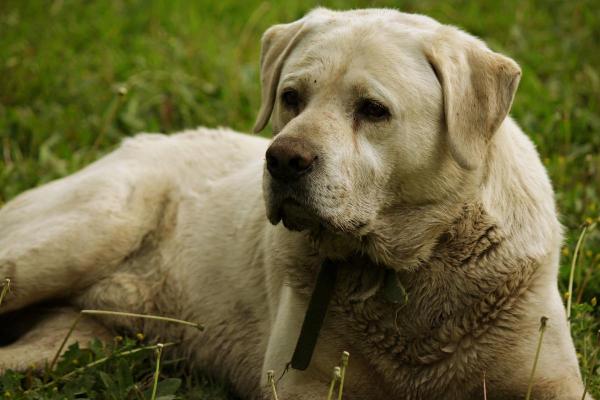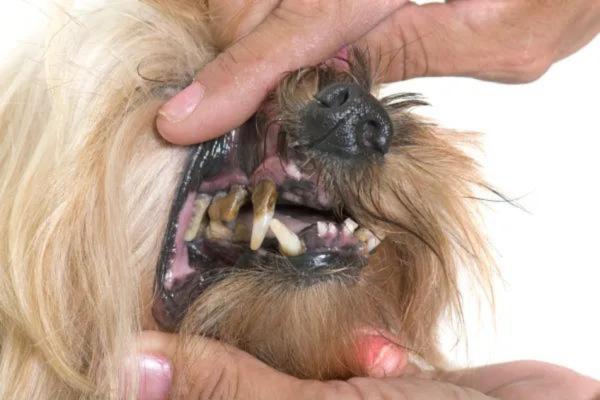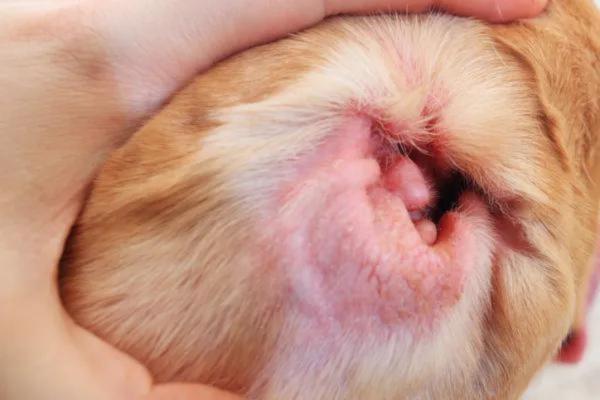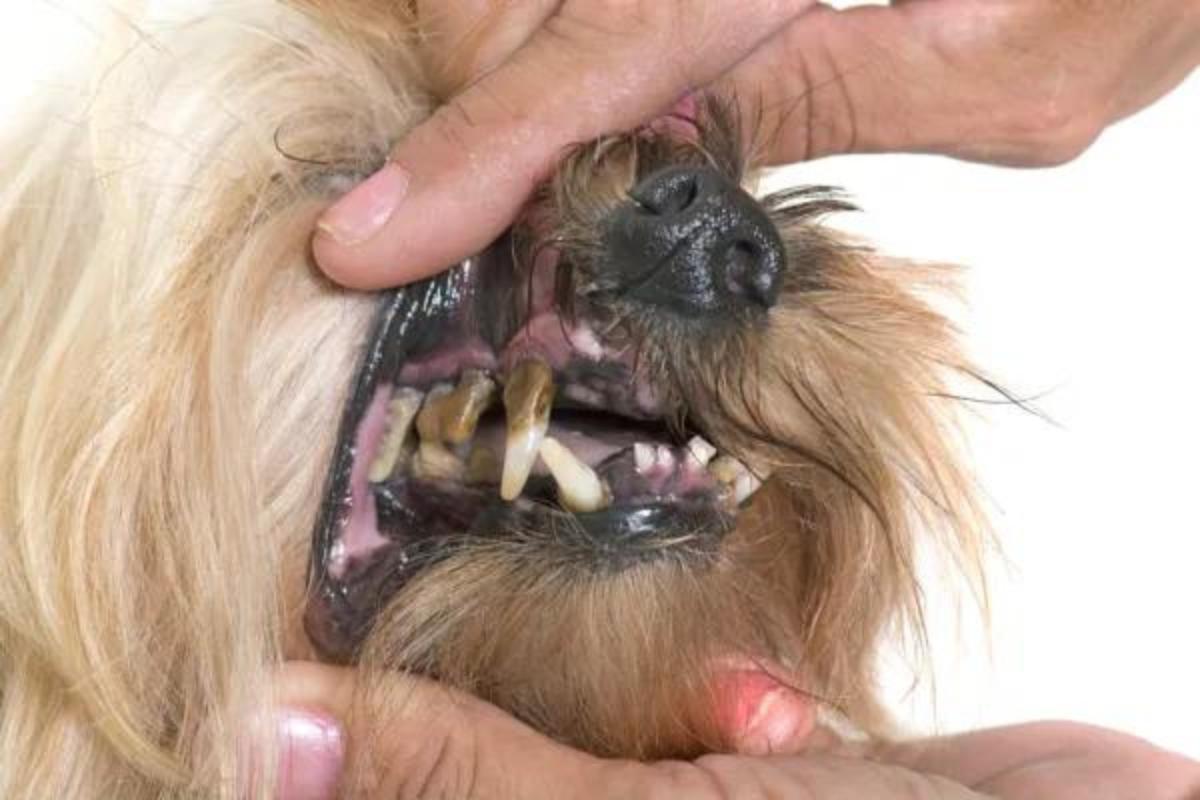Why Does My Dog Smell Like Fish?



See files for Dogs
Depending on what they last rolled in, dogs can smell like many things, but fish is one of the most unpleasant and common odors they develop. This foul odor can come from the mouth, the butt, or seemingly the entire body. If your dog smells like fish, it is usually the result of an underlying health problem. Causes of a fishy odor can range from something benign and easily remedied, like diet, to a sign of something that requires medical attention, like anal gland problems.
The following AnimalWised article explains the most common reasons why your dog smells like fish and what to do in each case.
Halitosis
Halitosis, better known as bad breath in dogs, can cause your dog's mouth to smell like fish. Several problems or diseases can be behind halitosis, including kidney disease, diabetes mellitus or periodontal disease. This fishy smell is caused by volatile sulfur compounds produced by bacteria in our dogs' mouths.
The main cause of fishy odor in dogs is tartar and periodontal disease. Oral bacteria attach themselves to proteins and food debris and calcify in the tooth enamel due to minerals deposited by saliva.
This tartar can accumulate around the edges or under the gums and cause inflammation or gingivitis. The bacteria can reach the periodontium and destroy the periodontal ligament and alveolar bone, leaving the teeth vulnerable to infection and abscesses.
Treatment of halitosis in dogs
Treatment of halitosis consists of treating the underlying disease that causes it. Since bad breath is most often caused by periodontal disease, treatment usually consists of a thorough cleaning of your dog's teeth. Your veterinarian may also recommend changing your dog's lifestyle, such as giving him chewable tablets for his teeth or switching from wet food to dry food. In more severe cases, your dog may need to take medications such as antibiotics, anti-inflammatories or painkillers. It is also possible to eliminate bad breath in dogs by controlling endocrine problems such as diabetes and kidney disease.
Some dogs have a genetic predisposition to dental disease, or dental problems can occur if you have not taken care of your dog's teeth carefully. How to take care of your dog's teeth, you will learn in this other article, where we explain different ways to clean your dog's teeth.

Urinary infection
In general, dog urine has a slight odor. If the odor is stronger than usual, it may indicate a urinary tract infection. Urinary tract infections occur in many dogs, especially bitches. Infectious agents, tumors, stones, and inadequate nutrition can influence their occurrence and development.
Symptoms are varied and include painful urination, increased water consumption, fishy odor, irritation, frequent urination at low volumes, and fever. Almost all urinary tract infections are caused by the bacterium Escherichia coli. These bacteria are commonly found in the environment and around the dog's genitals and anal area. They constantly enter the urethra from the outside.
Treatment of urinary infection in dogs
The most important treatment for a UTI is the administration of antibiotics. Based on your dog's urine test results, your veterinarian will prescribe an appropriate antibiotic to administer as directed. However, it is essential to determine if there is an underlying cause for urinary tract infections, especially if they are recurring. This may include urinary stones, kidney disease, and tumors or polyps.
Learn more about this disease, the possible causes and treatment by reading this other article about urinary tract infections in dogs.
Otitis
If you notice that your dog is constantly scratching their ears, shaking their head, and you smell a fishy odor coming from their ears, it could be a middle ear infection. Otitis media can have many causes, some of them include:
- Predisposing factors: include the condition of the ear canal, such as drooping ears and narrow ear canals.
- Certain pathologies: parasites such as mites, various types of allergies, foreign bodies in the ear or hormonal disorders.
- Other problems: otitis can also be caused by problems in the normal production of keratin or by the presence of polyps or tumors in the dog's ear canal.
Chronic otitis media often presents with symptoms such as discharge from the ear canal and head shaking. In addition, the dog may have pain when eating, barking, or trying to open their mouth. Occasionally, they will tilt their head to one side. If the inflammation has spread to the inner ear, numbness, and balance issues may also appear.
Treatment of otitis in dogs
Diagnosis is made by observation of symptoms and examination of the tympanic membrane. A bacterial culture of the discharge should be performed to determine the bacteria to be treated and their sensitivity to various antibiotics. Treatment usually consist of both middle ear irrigation and antibiotic treatment. In some cases, cortisone may be used to reduce inflammation.
Learn more about this relatively common condition in dogs, the possible causes and treatment by reading this other article on otitis in dogs.

Stress or fear
Dogs can sometimes emit an unpleasant odor from their anal glands. The anal glands are located on either side of the anus and produce an oily substance of varying color that is brown or whitish and has a strong odor. This substance serves not only as a lubricant for defecation, but also as a marker or defense. The odor may increase if the dog is suffering from anxiety or stress.
Stress is an automatic and adaptive response of the organism to any situation that triggers an emotion and could pose a threat. Other stress symptoms in dogs include: sudden changes in temperament, growling, yawning, loss of appetite and gastrointestinal problems such as vomiting, diarrhea and others.
You may also observe destructive behaviors such as compulsive chewing, destruction of household items, and accidents in the home.
Treatment of stress and fear in dogs
To treat stress in dogs, it is important to observe and find out what factors or situations trigger stress in our dog and start there. Other measures you can take as part of the treatment are: Optimizing walks, establishing routines, increasing the dog's mental and physical activities, reducing sudden changes in accommodation, to name a few. As always, we recommend that you consult a professional to determine a specific treatment tailored to your dog's individual needs.
Learn more about how to tell if your dog is stressed by reading this other article about 10 signs of stress in your dog.
Skin problems
There are certain skin diseases that are very common in dogs and can cause an unpleasant fishy odor. Some of these skin diseases are:
- Bacterial skin diseases
- Fungal skin diseases
- Dandruff or seborrhea
All of these diseases can cause the infamous fishy smell, but the most common are fungal and bacterial skin diseases, like a yeast infection.
A small amount of yeast is naturally present on the skin of dogs, and you can often smell it. However, when the yeast gets out of control, the skin becomes itchy and irritated. Dogs with allergies are more likely to have a yeast infection.
Treatment of canine skin problems
If you notice this odor in your dog and other symptoms such as excessive licking, hair loss, redness and sores, you should see your veterinarian as soon as possible. The skin problem in question must be treated specifically, with topical treatments such as ointments and treatment shampoos containing anti-inflammatory, antifungal or antibiotic agents. In some cases, it might be necessary to administer systemic oral therapy.
Continue reading this other article to learn more about the most common skin diseases in dogs, their causes, and treatment.

Anal sac disease
Anal sac disease is a blockage or inflammation of the glands in your pet's anal sac. As mentioned earlier, the anal sacs in dogs are two small sacs located on either side of the muscular wall of the anus.
Normally, the anal sacs empty when your pet has a bowel movement. However, your pet's anal sacs can become blocked and develop an infection. The appearance of anal sac disease is uncomfortable for your pet and may also cause an unpleasant fishy odor.
If left untreated, this disease can cause pain and itching. Your dog may have difficulty sitting, wag his tail constantly, strain to defecate, and show classic signs of pain, such as decreased appetite, panting, and hiding. Sometimes you may notice a lump or swelling in the area.
Treatment of Anal Sac Disease in Dogs
Prompt treatment of anal sac disease is critical. If left untreated, severe pain develops and anal sac disease soon escalates. If caught early, treatment consists of emptying of the anal gland and anti-inflammatory medications to clear the infection. However, if too much time passes, surgery, strong pain relievers, and antibiotics may be required. Your veterinarian may also recommend changing your pet's diet to prevent these problems in the future. It is common to increase fiber intake and add omega-3 and omega-6 supplements for anti-inflammatory effects.
Continue reading this other article to learn more about your dog's anal glands, their functions and how to keep them healthy.
If you want to read similar articles to Why Does My Dog Smell Like Fish?, we recommend you visit our Skin care category.
- J. Cerón, MJ Fernández, C. García, M. Hervera, SM Angulo, D. Pérez, C. Pérez, G. Santamarina. (2016). Clinical manual of small animal internal medicine I. ESVPS, Ed. SM Publishing Ltd. Sheffield, UK








